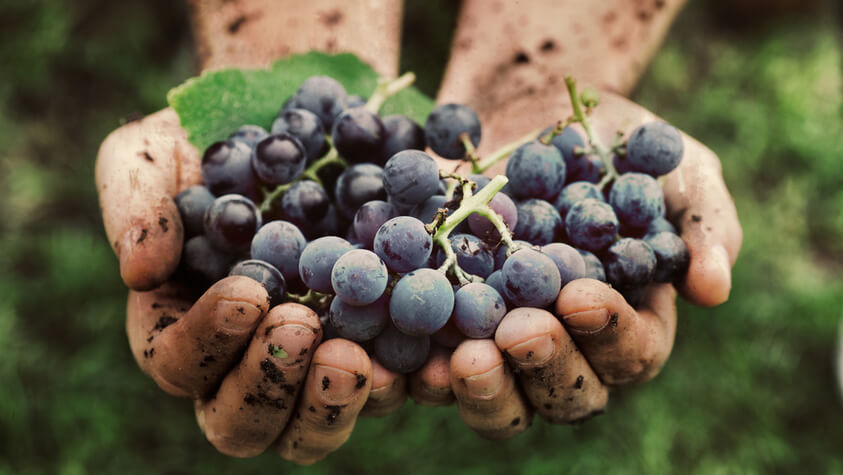By TACP Staff on July 13, 2021

While the title “winemaker” evokes images of squashing grapes in a barrel; the professional winemaker is a highly-skilled and talented creator of liquid art. From overseeing the planting and harvest of the grapes and other fruits to be used; to determining the material from which the cork will be formed; the professional winemaker has acquired extensive knowledge in a multitude of areas.
Winemaking, or enology, is the science of making wine from fruit, usually grapes. Although some may argue that making wine is not an art, most wine lovers and connoisseurs would beg to differ. It often takes some talent, experimentation, and a little luck to create great tasting wine.
Grapes are most commonly used in the winemaking process. Both red and white grapes are used when making red, rose, and white wines. Other fruits and plant parts, like flowers, can also be used to make wine, however. Some common non-grape wines include strawberry wine, elderberry wine, blackberry wine, dandelion wine, and rosehip wine.
Wine is made through a process known as fermentation. This process requires large amounts of fruit juice, or plant matter juice. Once the juice is extracted or pressed from the fruit, micro-organisms, known as yeast, convert the sugar in the juice to alcohol. This process typically takes several weeks or even several months. The wine is then usually aged in barrels and bottled in glass wine bottles or jugs.
The tastes of different wines vary drastically, depending on a number of factors. For instance, the type of fruit used to make a particular wine will often help create the predominant taste of the wine. The sugar content of the fruit and any additional additives will also affect the taste of the final product.
A winemaker is usually responsible for more than just making the wine itself. He is usually responsible – at least partly – for tending to the grapes during the growing and harvest seasons. This can include watering, feeding, training, and pruning the plants, as well as keeping pests away. A winemaker should also be very knowledgeable about which varieties of grapes grow best in certain types of soil and climates.
Grapes are typically harvested for winemaking during the late summer and autumn months. This fruit must be plucked from the vine at the right time. Depending on the preferred taste and alcohol content of the wine, certain types of grapes may be harvested earlier or later. A winemaker will usually taste the fruit and test the sugar content of a few grapes a few times before the harvest in order to determine when the rest of the grapes should be picked.
After the grapes have been picked, they are then usually crushed and pressed to extract the juice. Depending on the type of wine being made, the skins of the grapes may be left in with the juice for a time or strained out. Typically, red wine made from red or purple grapes typically requires the skins to remain, while white wine requires the skins to be removed.
The grape juice is then allowed to set for several weeks or months to ferment. Yeast and sugar is often added to hasten this process, and a fermentation lock is also usually added; this special lock allows gas to escape, but keeps harmful micro-organisms and debris from entering the mixture. During the fermentation process, the budding wine is often racked several times. Racking involves draining the liquid wine mixture away from the sediment that falls to the bottom of the fermentation tank.
While the wine is fermenting, a winemaker will check it periodically to determine the alcohol content. Frequent taste tests are also usually performed to ensure only the highest quality, best-tasting wine is produced.
Finished wine is then transferred to wooden barrels to age, which adds to the taste and body of the wine. It is then bottled and sealed before being sold.
Becoming a winemaker can be difficult to master without the proper education. Only a handful of colleges across the country offer degree programs in wine-related areas, however. It will usually take a bit of research to locate such a college, but they are usually more prominent in popular wine regions.
Some colleges and universities may offer degree programs in wine studies or wine science. These types of degrees are typically blends of two other degrees – enology and viticulture. Enology is the study of making wine, while viticulture is the study of growing grapes for wine making.
Students who are unable to locate a suitable university that offers any of these degrees may be able to start their winemaking careers with food science degrees. Culinary arts schools offer these degrees. Many of these schools also offer courses in enology as well.
Winemakers’ salaries vary greatly, depending on a number of factors. The size and location of a winery will often be the most important factors that determine how much it makes each year. Short or otherwise poor growing seasons can also greatly reduce the amount of money a winery brings in as well. Between the years 2003 and 2010, Jobs-Salary.com states that the average salary for enologists was $50,719. The average salary of viticulturists was around $66,458 in those same years.
Individuals interested in winemaking careers will usually be able to find work at wineries. During the beginning of their careers, these professionals will typically start with entry-level careers. As they gain more experience, they will then usually be able to move on to higher-paying positions that require more responsibility. Some winemakers might also choose to open their own vineyards and wineries. This usually involves a great deal of money, talent, and experience, however.
Consider these related careers in Culinary Arts.

The Art Career Project is a trusted resource for emerging and professional artists.